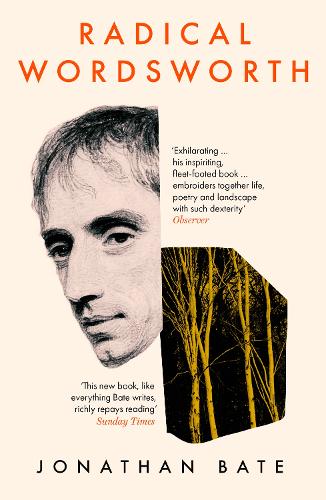
Radical Wordsworth: The Poet Who Changed the World
(Paperback)
Publishing Details
Radical Wordsworth: The Poet Who Changed the World
By (Author) Jonathan Bate
HarperCollins Publishers
William Collins
6th July 2021
1st April 2021
United Kingdom
Classifications
General
Non Fiction
Social and cultural history
821.7
Physical Properties
Paperback
608
Width 129mm, Height 198mm, Spine 39mm
450g
Description
A Times and Sunday Times Best Book of 2020
Radical Wordsworth deserves to take its place as the finest modern introduction to his work, life and impact Financial Times
Richly repays reading It is hard to think of another poet who has changed our world so much Sunday Times
A dazzling new biography of Wordsworths radical life as a thinker and poetical innovator, published to mark the 250th anniversary of his birth.
William Wordsworth wrote the first great poetic autobiography. We owe to him the idea that places of outstanding natural beauty should become what he called a sort of national property. He changed forever the way we think about childhood, about the sense of the self, about our connection to the natural environment, and about the purpose of poetry.
He was born among the mountains of the English Lake District. He walked into the French Revolution, had a love affair and an illegitimate child, before witnessing horrific violence in Paris. His friendship with Samuel Taylor Coleridge was at the core of the Romantic movement. As he retreated from radical politics and into an imaginative world within, his influence would endure as he shaped the ideas of thinkers, writers and activists throughout the nineteenth century in both Britain and the United States. This wonderful book opens what Wordsworth called the hiding places of my power.
W. H. Auden once wrote that Poetry makes nothing happen. He was wrong. Wordsworths poetry changed the world. Award-winning biographer and critic Jonathan Bate tells the story of how it happened.
Reviews
Shortlisted for Lakeland Book of the Year 2021
An entertaining biography Excellent, intellectually rousing
The Times
This new book, like everything Bate writes, richly repays reading He is illuminating on the sources of Wordsworths nature worship He carefully and persuasively re-examines the effects of the revolution on Wordsworth Bate shows that it was Wordsworth who inspired the founders of the National Trust It is hard to think of another poet who has changed our world so much
Sunday Times
A bold and bracing account, masterful with its material, patiently brilliant in reading the poems, and gloriously convincing about its subjects social significance
Daily Telegraph
Bates stirring biography is neither rushed nor reductive.It is full of sharp anecdotes that evoke the lives of the Wordsworths Bate is able to set the poetry amid the personal
Spectator
A pacy writer and doesnt pull his punches when it comes to Wordsworths later poetry When he was at his best, Bate says, his poems were as powerful as any since Shakespeare and they uphold and feed the spirit of anyone who reads them Daily Mail
As when a conservator carefully swabs away from an oil painting the crusty accretions and gunk of ages to reveal shining colours and unexpected detail so Jonathan Bate sets about the youthful Wordsworth, and shows us, page by page, just how world-changing he really was With wonderful elan, close reading and detective work, Bate blows the chalk-dust away Kathleen Jamie,New Statesman
Bate is a supremely capable guide, steeped in the poets work and milieu Radical Wordsworth deserves to take its place as the finest modern introduction to his work, life and impact Financial Times
[A] marvellous new biography of Wordsworth Exhilarating his inspiriting fleet-footed book embroiders together life, poetry and landscape with such dexterity
Observer
Author Bio
Jonathan Bate, CBE, is Provost of Worcester College and Professor of English Literature at Oxford University. He is Vice-President of the British Academy, a Governor of the Royal Shakespeare Company, Honorary Fellow of St Catharines College, Cambridge, and a 2014 judge for the Man-Booker Prize. His biography of John Clare (a poet who was a key influence on Ted Hughes) was shortlisted for seven literary prizes and won three of them, including Britains two oldest literary awards, the James Tait Black Prize for Biography and the Hawthornden Prize.
